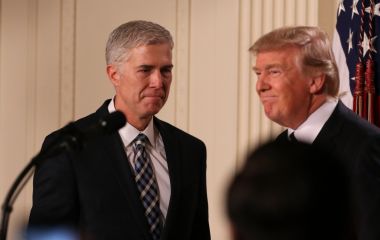What might Neil Gorsuch's appointment as Supreme Court Justice mean for conservative Christians?

Donald Trump yesterday appeared to be in his element during a White House ceremony for the swearing in of his Supreme Court pick Neil Gorsuch, the conservative judge whose pivotal appointment has been welcomed by traditionalist Christians.
The Republican-led Senate voted to confirm the Colorado-based federal appeals court judge to the life-long job on Friday despite Democratic opposition, enabling Trump to say he had fulfilled a crucial campaign promise.
The appointment means that the court now has five conservative justices and four liberals, a majority that could bear heavily on issues including abortion, gun control, the death penalty and religious rights.
'Together we are in a process of reviewing and renewing and also rebuilding our country,' Trump told an audience that included conservative activists as well as officials. 'A new optimism is sweeping across our land and a new faith in America is filling our hearts and lifting our sights.'
Conservative Christians were quick to welcome the appointment of Gorsuch, who was raised a Catholic but now worships with his wife and two daughters at St John's Episcopal Church in Boulder, Colorado. The church is seen as relatively liberal, representing what some commentators have said is Gorsuch's own 'complicated' relationship with the faith.
Nonetheless, Ashley McGuire, senior fellow with The Catholic Association, said: 'As Catholics, we welcome the confirmation of a judge whose record adheres to the Constitutional right to free exercise of religion without government bullying and whose scholarship affirms the inherent dignity in all people.'
Gorsuch fills a vacancy left on the bench by the death of Justice Antonin Scalia in February 2016. The former president Barack Obama had nominated Merrick Garland, chief judge of the DC circuit court, to fill Scalia's seat, but the Republican-led Senate refused to vote on his confirmation.
Though Trump refused to answer directly whether he supported the repeal of the 1973 ruling Roe v Wade which effectively legalised abortion, he had promised on the campaign trail to nominate a pro-life judge. Trump said in the final presidential debate in October: '[If] that [repeal] would happen, because I am pro-life and I will be appointing pro-life justices...it [the legality of abortion] will go back to the individual states.'
Pro-life campaigners leaders praised the confirmationof Gorsuch's appointment. Marjorie Dannenfelser, president of the Susan B Anthony List, said that 'the swift fulfilment of President Trump's commitment to appoint pro-life Supreme Court justices is a tremendous win for the pro-life movement'.
Jeanne Mancini, president of March for Life, added: 'November exit polls showed that one in five Americans prioritized the Supreme Court nomination when casting their vote, and with a majority of 57 per cent of those voters casting a vote for Donald Trump, it is clear that the majority of American voters wanted a strict constructionist.'
Religious liberty campaigners also said that Gorsich would redress the 'erosion' of religious freedom.
'A Supreme Court justice, like Judge Gorsuch, who understands and values our founding documents, and hews closely to their meaning will help ensure that all Americans can continue to prosper and that we, as Catholics, remain free in exercising our religious principles,' said Dr Grazie Pozo Christie, policy adviser with The Catholic Association.
The evangelist Franklin Graham in February described Gorsuch as 'an excellent choice' for the Supreme Court. 'He said he was going to appoint a conservative, and that's exactly what he has done in selecting Judge Neil Gorsuch for the Supreme Court,' Graham wrote on his Facebook page. 'From all that I have read and from his track record, Judge Gorsuch is an excellent choice whose decisions will be guided by the original intentions of the US Constitution and who will not try to legislate from the bench.'
Conservative campaigners hope that Gorsuch will make an immediate impact.
He will hear his first religious liberty case on April 19 with oral arguments in Trinity Lutheran Church v Pauley. The case involves a church's eligibility for a state reimbursement programme as it seeks to make safety upgrades to its playground which is used by members and non-members of the church. Opponents say that according to a Missouri state law, churches cannot benefit from taxpayer funds in such cases because doing so would be an unconstitutional establishment of religion. But Trinity Lutheran Church and its lawyers are arguing that the Constitution does not require religious entities to be penalised on the grounds that they are religious. They say that the playground is for the entire community, not just members of the church.
Gorsuch himself said yesterday: 'To the American people, I am humbled by the trust placed in me today. I will never forget that to whom much is given, much will be expected. And I promise you that I will do all my powers permit to be a faithful servant of the Constitution and laws of this great nation.'
And Trump said of Gorsuch: 'He will decide cases not based on his personal preferences but based on a fair and objective reading of the law'.
What that means in practice remains to be seen, but conservative Christians this week have reasons to rejoice.











